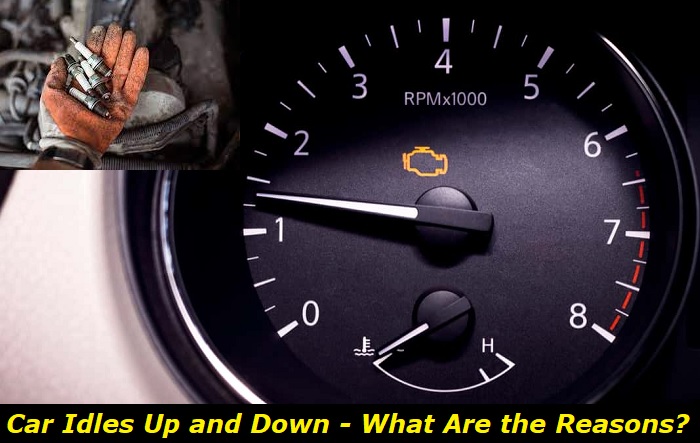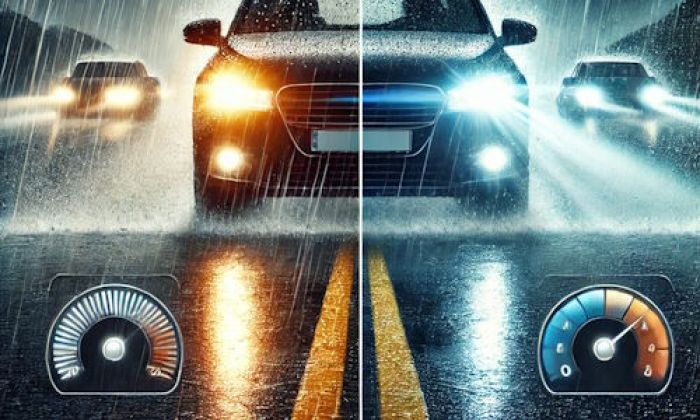As a driver, you will experience many issues with your vehicle. Some of which are scarier than others. You may be driving down the freeway and notice that your RPMs begin to fluctuate even with your foot off the gas pedal.
Electrical problems leading to RPM anomalies highlights
- DIY repairs:possible but complicated
- Tools needed:inspection and repair tools
- Commonreasons:idle control valve, throttle position sensor, wiring, software
- Time to repair:1 - 2.5 hours
- Price for parts:$50 - $300
- Can you drive?Yes
- Alternative solutions:unplugging sensors, resetting or relearning sensors

Possible Causes for Your Car to Idle Up and Down
If there is a problem with your vehicle's idle speed, you will notice that:
- There is a change in the sound your engine produces
- Your car begins to vibrate and shake
- You may lose engine power or acceleration
- You will experience difficulty starting your car when you switch it off.
There are several reasons and causes of your engine rpm rising and dropping at idle. We have explained some of these causes in this article.
1) Faulty Idle Valve
Your engine has a small valve that opens when you are not accelerating. It allows for a slow fuel flow into the engine, allowing it to idle steadily. When this valve fails, it results in abnormal fuel distribution during idle, affecting your engine's transmission and rpm.
A faulty idle valve causes the engine to speed up unnecessarily when you engage the accelerator and experience difficulty maintaining even idling speed.
2) Vacuum Leak
The intake manifold is where fuel and air mix in your engine. If there is a vacuum leak in this system, there will be an imbalanced mixture of fuel and air. As a result, you may experience high RPMs even when you are not accelerating.
If this is the issue causing your car to idle up and down, you will notice a high-pitched whine from the engine.
3) Spark Plug Problems
Several spark plug issues could cause your car to idle up and down. For instance, if these components wear out and you delay replacing them, they can no longer produce a potent spark. As a result, your engine can no longer run smoothly. This causes the engine to strain to compensate for the lost spark. You should inspect your spark plugs regularly and replace them when necessary.
4) Timing Belt Issues
The smooth operation of your engine relies on adequately synchronizing the crankshaft and the camshaft. If these components do not synchronize, they affect the correct timing of the valves. This causes your engine to strain to compensate, leading to the up-and-down idling of the engine.
Incorrect valve timing interferes with the fuel-to-air ratio and affects the engine's ability to produce the right amount of power.
The timing belt facilitates proper valve timing. If it fails or wears out over time, it can cause the unpredictable up-and-down idling of your car. Sometimes, you should only check the timing and adjust if necessary. However, if the timing belt wears out to the point of no return, you cannot start your car when you switch it off.
5) Throttle Position Sensor Problems
The Throttle Position Sensor is responsible for transmitting information to your vehicle's computer system about the position of the throttle pedal. If this component malfunctions, it can no longer send the proper communication to the computer system. As a result, it can lead to the erratic revving of your engine when it idles.
If the throttle is stuck in an open position and the sensor cannot transmit that information, your engine will receive excess air. This will cause the engine to experience a fluctuating idling speed. It may either be slow, high or up and down.
6) Clutch Malfunction
An automatic transmission vehicle self-shifts gears as it moves. You must shift gears manually as you accelerate or decelerate in a manual gearbox. When a part or the whole clutch system malfunction, it cannot perform its functions (shifting gears) correctly. The problem worsens when shifting to idle mode. In most cases, this issue slows down the engine RPMs.
7) Worn Fuel Injectors and Clogged Air Filters
Fuel Injectors and Air Filters work together to ensure the engine combustion chamber receives the right amount of fuel and air for complete combustion. While fuel injectors send the right amount of fuel to the engine, air filters control airflow into the combustion chamber.
When these components are in good condition, they ensure the correct fuel/ air ratio flows into the engine. When one or the two of them fail, they compromise this ratio. If the fuel injectors wear out or the air filter clogs, they result in abnormal acceleration and rpm spikes.
Car Idles Up and Down - How to Fix this
As discussed above, there are several possible reasons why your car idles up and down. The first step you or your mechanic should take is to check your vehicle's computer system. If your engine has a problem, you will find trouble codes saved in the system. These codes always have repair suggestions accompanying them.
The following are possible fixes to the problems causing your car to idle up and down.
- Spark Plugs: Check to confirm if your spark plugs are in good condition. If not, replace them immediately. This eradicates the problem right away.
- Vacuum Leak: If the up-and-down idling is because of a vacuum leak, you can fix this by identifying the exact cause of the leak. If a crack or a hole in the hose is causing the vacuum, you have to replace the entire hose. Other possible causes of vacuum leaks include loose fittings, which you can tighten to fix the issue, torn gasket, or a hole in the engine.
- Fuel Injectors and Air Filters: If your vehicle is idling up and down because of faulty fuel injectors, you can unclog them using recommended fuel injector cleaners or a high-pressure air hose to blast the debris and dirt. For a clogged air filter, the best solution is to replace the filter altogether.
- Idle Valve: A faulty idle valve is another reason for your car to idle up and down. To determine whether this is the problem, check your dashboard for the "check engine" light. If this light comes on when your engine is idling, chances are the idle valve is faulty. The best way to repair a bad idle valve is to involve a professional mechanic.
- Timing Belt: If your problems are because of timing belt issues, it is essential to check this area regularly. You can adjust the timing to fix the up-and-down idling. However, sometimes, you will need to replace the timing belt altogether.
- Throttle Position Sensor: If your vehicle is idling up and down because of a faulty throttle position sensor, there are a few fixes that can eradicate the problem. The first place to check is the wiring system. Are all wires and connectors in good condition? Next, check the sensor. If dirt and debris are causing the sensor to malfunction, you can clean and fix it. If these areas are in perfect condition, you should take your vehicle to a professional mechanic for diagnosis.
Car Idles Up and Down - Look Out for the Following
Tachometers are standard instruments in vehicles. The tachometer has markings that show rotations per minute at different speed levels.
The standard idling rpm for a gasoline passenger vehicle is between 1500 and 2000, and 750 rpm for diesel cars. The idling speed for medium and heavy-duty gasoline trucks does not exceed 600 rpm.
The maximum rpm for a diesel car at high speed is 2000, and 6000 rpm for gasoline vehicles. When the counter on the tachometer exceeds these rates, the engine is always at risk of severe damage. If you stay in the red zone for a long time, you can cause irreversible damage to your engine. This could happen whether you are accelerating or idling.
Conclusion
Understanding what it means when your car's rpm misbehaves is essential. Always take note of the strange sounds your engine produces and the tachometer reading whenever you suspect a problem with your engine's idling speed. Straining your engine too much could mean permanent damage or shortened vehicle lifespan.
Some of these issues may sound minor, and many people ignore them. However, while they will not leave you on the roadside stranded today, they will eventually do. Fixing an issue when you learn of it is essential to avoid more damage.
About the authors
The CarAraC research team is composed of seasoned auto mechanics and automotive industry professionals, including individuals with advanced degrees and certifications in their field. Our team members boast prestigious credentials, reflecting their extensive knowledge and skills. These qualifications include: IMI: Institute of the Motor Industry, ASE-Certified Master Automobile Technicians; Coventry University, Graduate of MA in Automotive Journalism; Politecnico di Torino, Italy, MS Automotive Engineering; Ss. Cyril and Methodius University in Skopje, Mechanical University in Skopje; TOC Automotive College; DHA Suffa University, Department of Mechanical Engineering






Add comment